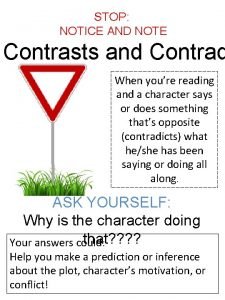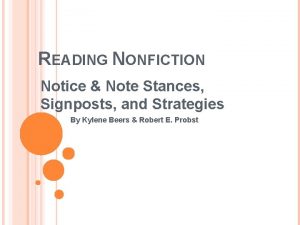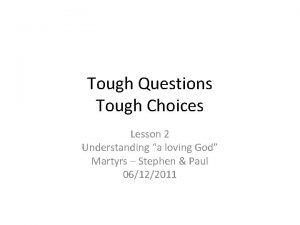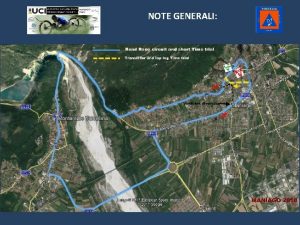NOTICE AND NOTE STRATEGY TOUGH QUESTIONS WHAT ARE











- Slides: 11

NOTICE AND NOTE STRATEGY: TOUGH QUESTIONS

WHAT ARE TOUGH QUESTIONS? We ask questions all the time such as “What’s for dinner? ”, “Where are my shoes? ”, or “Do I really have to do my homework? ” We want answers, but these aren’t exactly really tough questions. Tough questions are the ones we ask ourselves, or someone else, that seem not to have an answer, at least for a while. We might ask, “How will I ever get over this? ” when we hear that a loved one has died; or we might ask, “What should I do? ” when we have a difficult, almost impossible, choice to make; or we might ask, “Am I brave enough to say no? ” when we’re asked to do something we know we should do. If someone breaks up with you, you ask, “Why? ” Tough question are part of life.

INTERNAL CONFLICT When you share a tough question with a friend—or just think it to yourself— you’re really sharing something that bothers you. In a novel, we call that the internal conflict. If you can spot in a novel the tough questions a character asks of himself or to a friend, then you’ll have found the internal conflict.

SPOTTING TOUGH QUESTIONS The main character either asks a trusted person or him/herself a question that obviously doesn’t have an easy answer. Often shows up in pairs: “Why won’t they talk to me anymore? Why is everyone treating me this way? ” Might not be a question, but something like “I wonder if…” or “I can’t see how…”


APPLYING THE STRATEGY A Long Walk to Water


Excerpts from A Long Walk to Water by Linda Sue Park _______________________________ Salva lowered his head and ran. He ran until he could not run anymore. Then he walked. For hours, until the sun was nearly gone from the sky. Other people were walking, too. There were so many of them that they couldn’t all be from the school village; they must have come from the whole area. As Salva walked, the same thoughts kept going through his head in rhythm with his steps. Where are we going? Where is my family? When will I see them again?

There were now three women giving water to the men on the ground. Like a miracle, the small amounts of water revived them. They were able to stagger to their feet and join the group as the walking continued. But their five dead companions were left behind. There were no tools with which to dig, and besides, burying the dead men would have taken too much time. Salva tried not to look as he walked past the bodies, but his eyes were drawn in their direction. He knew what would happen. Vultures would find the bodies and strip them of their rotting flesh until only the bones remained. He felt sick at the thought of those men—first dying in such a horrible way, and then having even their corpses ravaged. If he were older and stronger, would he have given water to those men? Or would he, like most of the group, have kept his water for himself? It was the group’s third day in the desert. By sunset, they would be out of the desert, and after that, it would not be far to the Itang refugee camp in Ethiopia.

I am alone now. I am all that is left of my family. His father, who had sent Salva to school. . . brought him treats, like mangoes. . . trusted him to take care of the herd. . His mother, always ready with food and milk and a soft hand to stroke Salva’s head. His brothers and sisters, whom he had laughed with and played with and looked after. . He would never see them again. How can I go on without them? But how can I not go on? They would want me to survive. . . to grow up and make something of my life. . . to honor their memories.

REVIEW Authors use Tough Questions to give us insight into the struggle the main character faces When we spot them, we should ask ourselves, What does this make me wonder about? It’s easy to read right past them, since the author seldom gives us an answer at this point The author wants us to recognize what concerns the character Understanding the character’s situation helps you better contemplate how you might react in similar circumstances. When you’re able to do that, you will have a much deeper understanding of the conflicts presented.





















